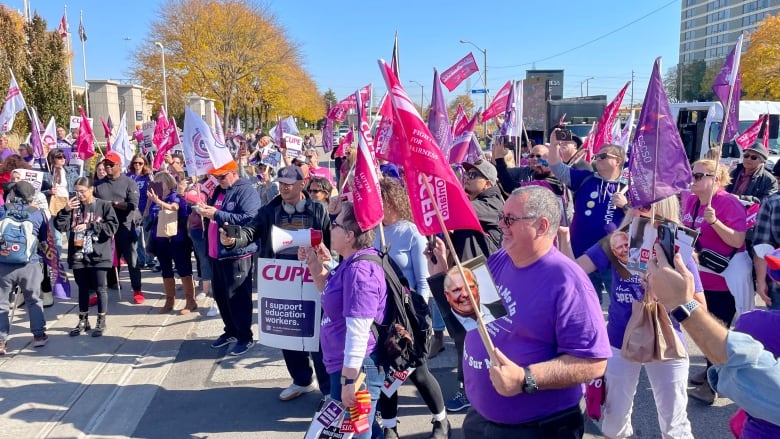Education workers rally outside Ontario PC convention, days after contract talks broke down
About 55,000 education workers represented by CUPE will be in a legal strike position on Nov. 3

Almost 200 protestors gathered Saturday in front of the Ontario PC convention in Toronto in a show of support for education workers.
The rally comes days after contract talks between the Ford government and CUPE, the union representing about 55,000 education workers, broke down.
"We know they're in there talking about what their next policy decisions are going to be," said Laura Walton, the president of the Ontario School Board Council of Unions.
"But at the end of the day, a strike can be averted. It means coming to the table with an actual deal that respects workers and respects families."
CUPE, which represents workers such as educational assistants, custodians and librarians, said the mediator assisting with bargaining this week has concluded the two sides are too far apart and talks should be adjourned.
The parties are set to return to the table Nov. 1 for an indeterminate amount of time.
When talks broke down, Education Minister Stephen Lecce said CUPE is "trying to disrupt in-class learning by refusing to compromise" on what he calls unreasonable demands.
CUPE is looking for annual salary increases of 11.7 per cent and the government in response has offered raises of two per cent a year for workers making less than $40,000 and 1.25 per cent for all others.
Education workers are also presenting other proposals, such as overtime at two times the regular pay rate, 30 minutes of paid prep time per day for educational assistants and ECEs, an increase in benefits and professional development for all workers.
Why workers are protesting
Michelle Campbell, a developmental services worker working in York Region's public school system, says she came out in protest against Education Minister Stephen Lecce and Premier Doug Ford's treatment of education workers throughout the years.

At one point, she says she took on three jobs to make ends meet, working 30 to 40 days without a day off. This ultimately landed her a fibromyalgia diagnosis, Campbell said.
"I can't continue doing a job that I love with the amount of money I'm earning right now," said Campbell, who said she sold her house and moved to a one-bedroom apartment to make do.
"Seventeen years ago it worked, but with inflation and hardly any increases in our pay, it's just not feasible."
Chris Kaspiris, also a developmental support worker with the York Region District School Board, says because of how understaffed his school is, it's common for workers to not take their breaks or lunches, running from one child to the next. Because without them, he says, children with complex needs won't be engaged in the classroom.
"We are here to make sure the government funds supports properly in our school system," said Kaspiris.
"Without us being there, a school would not function."

CUPE education workers are in a legal strike position as of Nov. 3 and Walton previously said what happens on that date depends on the talks leading up to that.
In previous bargaining rounds, work-to-rule didn't provide enough pressure. In 2019, CUPE and the government reached a last-minute deal the day before workers had been set to go on a full strike.
With files from Mehrdad Nazarahari